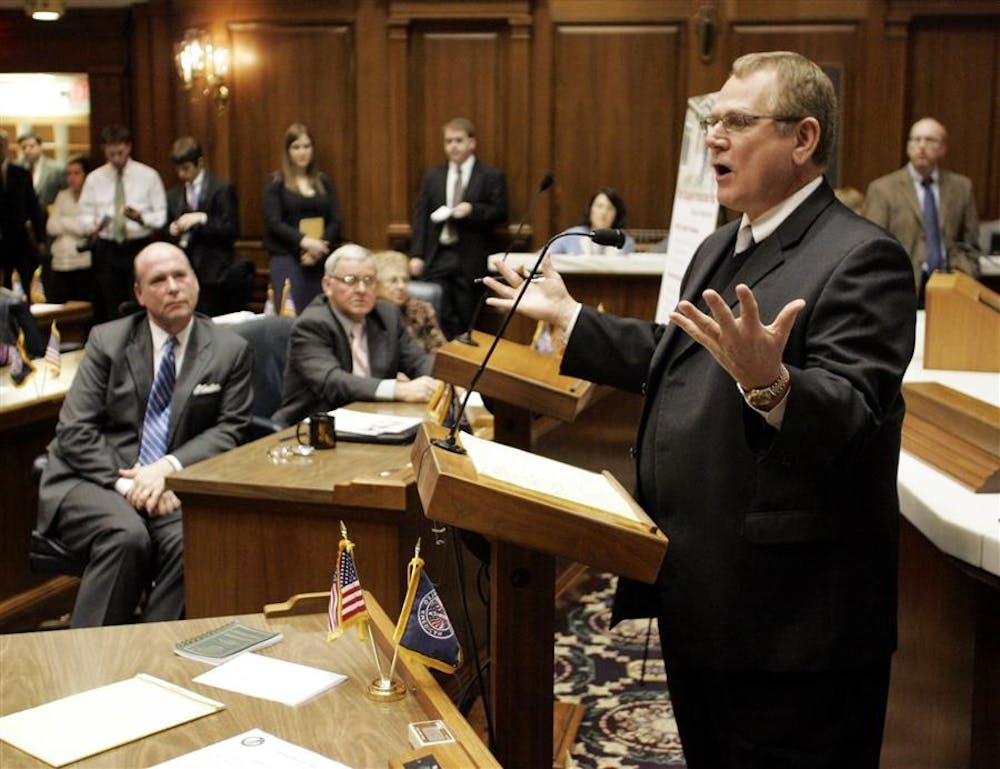INDIANAPOLIS – The Indiana House approved legislation Monday to put property tax bill caps into the state constitution.
The House also approved a bill that would tighten lobbying and ethics rules.
The Senate is expected to pass the same property tax measure, which would allow voters to decide in November whether to amend the state constitution to limit property taxes.
State law already limits property tax bills to 1 percent of homes’ assessed value, with 2 percent caps on rental property and 3 percent limits on business property. But adding the limits to the constitution would make it harder for future legislatures to undo them.
The House voted 75-23 for the property tax measure, with proponents saying putting the caps in the constitution will give taxpayers security.
“For the first time, taxpayers will now have peace of mind in knowing how much taxes they will have to pay,” said Rep. Milo Smith, R-Columbus.
The property tax caps are expected to save taxpayers about $450 million this year. Some lawmakers oppose not only writing the limits into the constitution but the caps themselves. They say the caps mean less money for local governments and schools and will result in layoffs and reduced services.
“People don’t like paying taxes, but we know there is a need for taxes,” said Rep. Vernon Smith, D-Gary. “I believe taxes are a necessary evil. People want services. I don’t believe we know the ramifications of these caps.”
The General Assembly passed the same legislation in 2008, but it takes passage by two consecutively elected legislatures to put a constitutional amendment before the people.
The House voted 97-2 for an ethics and lobbying bill sponsored by House Speaker Patrick Bauer, D-South Bend.
The bill would prohibit lawmakers from becoming lobbyists for one year after their terms expire, regardless of whether they complete their terms. It also would require lobbyists to report gifts worth $50 or more, including meals, drinks and tickets to events. The current threshold is $100.
The bill also would bar the governor from raising campaign contributions during the long, budget-writing sessions of the General Assembly held in odd-numbered years. Lawmakers are already prohibited from fundraising during that time.
Also, anyone with a state contract or bidding on one worth $100,000 or more per year would not be able to donate to the campaigns of people running for state office.
Bauer said he believed that all current lawmakers were honest, and there were no scandals in the General Assembly.
But, he said, “This tries to bring clearness to many issues and bring more public confidence. This tries to improve the perception of the process.”
Republican Reps. David Wolkins of Winona Lake and Tim Brown of Crawfordsville were the only House members to vote against the bill.
Wolkins said many of the provisions were questionable, and the issue should be sent to a summer study committee for further review.
A Senate committee on Monday endorsed an ethics bill by Sen. Patricia Miller, R-Indianapolis, and advanced it to the full Senate.
Miller’s bill also would require lawmakers to report gifts worth $50 or more and wait a year before becoming a lobbyist.
It would also expand state registration and reporting requirements to include university officials who lobby the legislature and increase penalties for failing to file lobbyist registrations and reports in a timely manner. The penalties would go up from $10 per day to $100 and the maximum would go from $100 to $9,000.
Ind. House approves property tax measures

Get stories like this in your inbox
Subscribe





